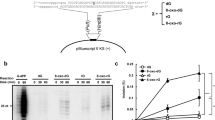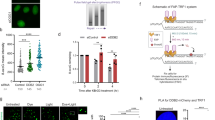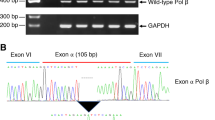Abstract
Using UvrABC incision in combination with ligation-mediated PCR (LMPCR) we have previously shown that benzo(a)pyrene diol epoxide (BPDE) adduct formation along the nontranscribed strand of the human p53 gene is highly selective; the preferential binding sites coincide with the major mutation hotspots found in human lung cancers. Both sequence-dependent adduct formation and repair may contribute to these mutation hotspots in tumor tissues. To test this possibility, we have extended our previous studies by mapping the BPDE adduct distribution in the transcribed strand of the p53 gene and quantifying the rates of repair for individual damaged bases in exons 5, 7, and 8 for both DNA strands of this gene in normal human fibroblasts. We found that: (i) on both strands, BPDE adducts preferentially form at CpG sequences, and (ii) repair of BPDE adducts in the transcribed DNA strand is consistently faster than repair of adducts in the nontranscribed strand, while repair at the major damage hotspots (guanines at codons 157, 248 and 273) in the nontranscribed strand is two to four times slower than repair at other damage sites. These results strongly suggest that both preferential adduct formation and slow repair lead to hotspots for mutations at codons 157, 248 and 273, and that the strand bias of bulky adduct repair is primarily responsible for the strand bias of G to T transversion mutations observed in the p53 gene in human cancers.
This is a preview of subscription content, access via your institution
Access options
Subscribe to this journal
Receive 50 print issues and online access
$259.00 per year
only $5.18 per issue
Buy this article
- Purchase on Springer Link
- Instant access to full article PDF
Prices may be subject to local taxes which are calculated during checkout
Similar content being viewed by others
Author information
Authors and Affiliations
Rights and permissions
About this article
Cite this article
Denissenko, M., Pao, A., Pfeifer, G. et al. Slow repair of bulky DNA adducts along the nontranscribed strand of the human p53 gene may explain the strand bias of transversion mutations in cancers. Oncogene 16, 1241–1247 (1998). https://doi.org/10.1038/sj.onc.1201647
Received:
Accepted:
Published:
Issue Date:
DOI: https://doi.org/10.1038/sj.onc.1201647
Keywords
This article is cited by
-
Carcinogen-induced DNA structural distortion differences in the RAS gene isoforms; the importance of local sequence
BMC Chemistry (2021)
-
Integrated analysis of somatic mutations and focal copy-number changes identifies key genes and pathways in hepatocellular carcinoma
Nature Genetics (2012)
-
Analysis of P53 mutation and invasion front grading in oral squamous cell carcinomas
Journal of Huazhong University of Science and Technology [Medical Sciences] (2010)
-
Common tumour p53 mutations in immortalized cells from Hupki mice heterozygous at codon 72
Oncogene (2008)
-
Nature and nurture – lessons from chemical carcinogenesis
Nature Reviews Cancer (2005)



